Progress report for LNE23-467
Project Information
Problem or Opportunity and Justification:
In the U.S., individuals with intellectual and developmental differences (I/DD) have been historically underserved and undervalued. Despite an increased focus on diversity, equity, and inclusion in the workforce, adults with I/DD are often excluded. As a result, neurodivergent individuals have a greater unemployment rate compared to the general population.
Solution and Approach:
Care Farming is the therapeutic use of farming practices for marginalized or vulnerable groups of people. By building the Care Farming Network (CFN), agriculture in the Northeast will be diversified by providing meaningful employment and work opportunities to adults with I/DD.
The CFN Northeast project will develop a sense of connection between Care Farmers and strengthen their farm practices to expand employment opportunities for individuals with I/DD on their farms. To achieve this, we identified three goals.
First, the CFN will increase awareness about the unique field of Care Farming and its therapeutic benefits. We will research and identify established Care Farms and farmers, conduct site visits, and interview farmers to facilitate connections and share best practices. We will coordinate Care Farming panels at farmer conferences (Northeast Organic Farming Association, Future Harvest Chesapeake Alliance for Sustainable Agriculture, Pasa Sustainable Agriculture) and utilize social media channels to share stories of Care Farmers, creating visuals highlighting the benefits of Care Farming.
Second, we will build community among Care Farms in the region by hosting farm tours, farmer-to-farmer exchanges, and performing site visits. Training and workshops will be offered both virtually and in person.
Third, we will build capacity for meaningful employment opportunities for adults with I/DD at both established and beginning Care Farms. The CFN will identify six regional Care Farm mentors to support beginning Care Farmers. Mentoring will include consultations and site visits. We will host a mentorship retreat where established Care Farmers will convene and establish best practices within the Care Farming community. The CFN will create a tool kit of these best practices to share with both established and beginning Care Farmers. Finally, we will develop an annual regional conference to further build on the farmer connections and education.
We anticipate 100 beginning and established Care Farmers will participate in Network activities, with 90 Care Farmers reporting that they feel more connected with other Care Farmers and have improved their work effectiveness in post-survey results. Through ongoing Network activities and the mentorship program, we will increase capacity of both established and beginning Care Farms to employ people with I/DD and provide meaningful work opportunities.
25 Care Farms will join the Care Farming Network, supporting 100 total Care Farmers. Of that 100, 90 will report increased effectiveness and sense of connection, leading to the hiring of 15 additional people with intellectual and developmental differences.
Description of Problem or Opportunity
In the U.S., individuals with intellectual and developmental differences (I/DD) have been historically underserved and undervalued. Eighty-five percent of adults with developmental differences do not have a paid job in their community (Mahto, 2022). The cost of underemployment of individuals with I/DD is substantial to the individuals, their families, and the communities in which they live.
Since 1996, Red Wiggler Community Farm (Maryland) has met this need for employment by providing meaningful work for adults with I/DD by operating a 120 member certified organic vegetable Community Supported Agriculture (CSA). Red Wiggler successfully balances vegetable production alongside its inclusive mission providing opportunities for neurodivergent individuals to be teachers and leaders.
Red Wiggler’s decades of innovative accomplishments resulted in other Care Farms reaching out to them for support, which then showed the need and opportunity to expand employment of people with I/DD nationwide. In its unique position as a Care Farm operating for more than 25 years, Red Wiggler provides consultations to aspiring and beginning farmers focused on employing individuals with differences. Many Care Farms are started by parents of children with I/DD, who struggle to find feasible options for their adult children and establish a Care Farm of their own, given the lack of meaningful work opportunities in their area.
In addition, Red Wiggler has identified 25 established Care Farms throughout the Northeast that employ individuals with I/DD. Until recently, there was no opportunity for a network of farmers, providers, and producers to come together and share knowledge and skills. This often results in farmers and staff experiencing burnout and exhaustion because they do not have access to a network to lean on for support or guidance.
The resulting consequence is a disproportionate balance: more people with I/DD seek employment at Care Farms than there are existing Care Farms capable of supporting the demand for employment. To address this imbalance, the Care Farming Network (CFN) aspires to establish a Care Farm in every county throughout the U.S. The CFN will not only support existing Care Farmers but will also provide consultations, resources, and a support network for aspiring Care Farmers and organizations to startup new Care Farms.
Solution and Benefits
As a leader and example of a well-established and successful Care Farm for 26 years, Red Wiggler created the Care Farming Network (CFN) in 2020. The CFN is a catalyst for creating and sharing resources for Care Farms to be successful. In just the past year, our database has grown 175%, from 150 members in September 2021 to 413 in October 2022. This rapid growth underscores both the urgency and desire for support for beginning and existing Care Farms.
By advancing the CFN, Care Farmers in the Northeast will steward resources to ensure sustainability. Neurodivergent individuals will gain a professional identity as farmers and find meaning in their ability to give back to the community through the growing and distribution of healthy food.
While Red Wiggler has done initial outreach to and research on Care Farms in the Mid-Atlantic area, the full extent and types of Care Farms in the Northeast are unknown.
Our initial research and data collection will track and identify the current landscape of Care Farms in the Northeast (number, types of Care Farms, demographic data including client population, farm type, revenue, budget), current Care Farmer needs, and the factors that may limit serving their client population. These questions will be addressed: What is the staff/client ratio? What are the infrastructure constraints? What are the funding needs?
Once Care Farms have been identified, interviews and surveys will be conducted to document the impact of Care Farming. This research will raise awareness of the Care Farming movement and improve long term sustainability.
By connecting Care Farmers to one another through the CFN, farmers can learn from each other, share and develop best practices together; overall strengthening the Care Farming movement. By increasing peer interactions and providing learning opportunities for established and beginning Care Farmers, farmers will feel an increased sense of connection, preventing burnout and overall improving the quality of their life. From these connections and learning opportunities, Care Farmers will improve their effectiveness, thus increasing their capacity for providing meaningful employment opportunities for adults with intellectual and developmental differences (I/DD).
Farmer Interest
In 2018, Red Wiggler Community Farm, in partnership with Future Harvest, hosted the Mid-Atlantic Care Farming Summit, which attracted over 70 attendees from 7 states. The summit brought farmers together who use Care Farming for the benefit of neurodivergent individuals. Out of 36 post-summit surveys, 35 participants indicated interest in attending an annual regional Care Farming conference and 34 indicated interest in sharing best practices and resources on a document portal.
Throughout Red Wiggler’s history, Executive Director and Founder, Woody Woodroof, has provided technical assistance to farmers interested in starting up Care Farms. He has offered consultations and ongoing support to establish these Care Farms, which are operating today: A Farm Less Ordinary (VA), Langton Green Community Farm (MD), Homefields Care Farm (PA), and Fields 4 Valor (MD).
Since July 2021, Red Wiggler has received 33 requests for consultations and provided 17 pro-bono consultations to beginning and established Care Farmers. In addition, we have begun referring people to other Care Farms in their geographic regions using feedback from our outreach efforts.
There are three potential categories of participants: (1) established Care Farms, their farmers, staff, and neurodivergent employees and participants; (2) aspiring and beginning farmers interested in Care Farming; and (3) established farmers who may want to hire someone with a disability or provide a more inclusive work environment. Our initial outreach will be to established Care Farms and aspiring or beginning Care Farmers in the Northeast SARE region. We have identified 25 Care Farms throughout the Northeast SARE footprint working with individuals with intellectual and developmental differences (I/DD) and anticipate 100 beginning and established Care Farmers will participate in Network activities throughout this project.
Cooperators
- (Researcher)
- (Educator)
Research
The overall goals of this research project are to collect data on current Care Farms in the Northeast and to promote and expand awareness throughout the U.S. Care Farming utilizes farming and agriculture activities as a therapeutic base for promoting health and wellness. This research project will address questions related to Care Farming and individuals with intellectual and developmental differences (I/DD). The first question is: what are the characteristics of successful Care Farms throughout the U.S.? The second question is: What impact does Care Farming have on the employed individuals with I/DD?
Methodology
In order to gain a deeper understanding of the characteristics of successful Care Farms and their impact on employed individuals with intellectual and developmental differences (I/DD), an explanatory sequential mixed methods design will be utilized. An explanatory mixed methods design is a two-phase data collection process, involving first collecting quantitative data, analyzing the results, and then building on the results to plan the (second) qualitative phase (Creswell & Creswell, 2018, p. 222). The overall intent of this design is to have the qualitative data help explain in more detail the quantitative results, blending the quantitative results with the qualitative data (Creswell & Creswell, 2018, p. 222). Quantitative data will be collected through surveys sent to various Care Farms and descriptive statistics such as mean, mode, and ranges will be utilized. Furthermore, farm data will be correlated in order to better understand the reasons behind success. In addition to surveys, qualitative and phenomenological data will be collected through semi-structured interviews with staff and other individuals involved with Red Wiggler Community Farm. A phenomenological study explores and focuses on an individual’s experiences. Instruments utilized to transcribe data include Otter.ai and SPSS. Otter.ai offers real time transcription and is utilized for transcribing recorded audio interviews collected. Additionally, SPSS or Excel will be utilized for numerical data analysis.
Population
Participants for this research study include neurotypical staff and staff with I/DD involved with Red Wiggler Community Farm and Care Farms across the Northeast. The Care Farming Network (CFN) project team and advisory committee will advocate and promote the study through distribution of informational fliers. Willing participants will be informed of the nature of the study and informed consent will be obtained prior to data collection. An informed consent cover letter will be emailed and discussed prior to the interview for participants who choose to complete the interview virtually. An informed consent agreement will be provided to participants choosing to complete the interview face-to-face. Lastly, informed consent will be attached to the survey for participants who choose to complete it. Participants will be included in the study if they or their guardian provide consent to participate in the research study. Prior to recruitment, Institutional Review Board approval will be obtained through the University of Central Arkansas (UCA). Participants will not be excluded based on their race, gender, sexual orientation, socioeconomic status, disability, religion, or marital status.
Data Collection and Analysis
Surveys with informed consent attached will be sent virtually to various Care Farms in the Northeast. The goal of the surveys is to collect data of the various characteristics related to successful Care Farms. This initial data collection will analyze the number, type, demographics, revenue, client population, and number of staff associated with Care Farms. In order to organize the characteristics related to successful Care Farms, the investigators will analyze the descriptive data collected from the surveys through SPSS or Excel programs. Secondary to surveys, informed consent agreement forms will be collected from study participants at Red Wiggler Community Farm. Afterwards, on-site and virtual interviews will begin. Through guided questions, interviewers will collect information on how Care Farming impacts individuals with I/DD. Each participant in the study will be assigned a random identification number to protect the anonymity of all study participants. After each interview is complete, interviews will be transcribed using Otter.ai and edited for grammar, spelling, and punctuation prior to thematic data analysis. Following transcription of interviews, participants will be randomly selected for member checking to ensure validity of responses. After interviews have been transcribed and organized, coding will be performed individually by each investigator using the steps outlined in Percy, Kostere, and Kostere (2015), and codes and themes will be reconciled among investigators to ensure validity (Creswell & Creswell, 2018, p. 193). Themes will be supported using quotes and other evidence from the interviews and observations (Creswell & Creswell, 2018, p. 200). Data collected in the study will be stored on password protected laptops in encrypted, password protected folders and will be available to all researchers. Research results will be published in peer-reviewed journals and disseminated through the CFN email newsletter and social media.
Farmer Input
Red Wiggler Community Farm has employed people with I/DD for over 26 years and has made immeasurable differences in the lives of those employed. They have offered individuals a sense of professional identity, and taught life skills that are difficult to obtain without opportunities such as Care Farming. Additionally, Red Wiggler staff have extensive knowledge on Care Farming and are willing to share their knowledge with established and beginning farms through consultations and mentoring programs. This knowledge sharing will lead to improved sustainability, connectedness, knowledge, and will offer a community to those interested in Care Farming. Additionally, Red Wiggler will promote the research study in order to recruit participants. The data collected and analyzed will help in the development of educational programs and increased employment opportunities for individuals with I/DD. Overall, this research will add to the limited body of Care Farming research that currently exists in the U.S.
2023 & 2024 &2025 Update
The CFN project team, Dr. Jackson, and Dr. Gangluff, met and designed the phase one quantitative data survey for established care farmers. Barnhart & Mudge obtained CITI certification, while the IRB was approved by the University of Central Arkansas IRB board in September 2023. CFN staff emailed the initial survey in October 2023 to 372 northeast contacts in the CFN database, representing 111 care farms with 43 care farms competing the survey. The CFN project team, Dr. Jackson and Dr. Gangluff, obtained IRB approval for the phase two qualitative study and completed forty-one interviews across six farms in the Northeastern United States. There were three stakeholder perspectives including farmers with I/DD, parents, farm volunteers, and farm support staff/leadership. Of the forty-one interviews sixteen were farmers with I/DD, ten were parents of farm employees with I/DD, ten were farm staff members, two were farm volunteers and three were founders/executive directors.
Education
2023 & 2024 & 2025 Update
CFN team performed extensive internet searches on farms in the northeast, using the terms “care farm”, “disabilities”, “intellectual disability”, “neurodiverse”, “autism”, and “neurodivergent.” From these searches, the CFN team identified 75 farms in the northeast that work with a neurodivergent population. CFN began initial outreach to these farms, researched their characteristics, and added them to the CFN online map and directory. CFN team sent initial emails and conducted phone calls with farmers who work specifically with neurodivergent people, introducing these farms to the concept of care farming and its therapeutic benefits. During these calls, we shared resources and identified care farmers’ interests and needs.
In addition, CFN contacted each state's Northeast Organic Farming Association organization and highlighted Care Farms on our social media channels, blog, and website. Through outreach efforts, the Northeast CFN email list increased from 252 email addresses to 1020 subscribers.
The Care Farming Network provided ongoing support, engagement, and learning to both aspiring and established care farmers through these activities:
- Hosted twenty-six Virtual Monthly Member Gatherings from March 2023-December 2025 on the topics of: social media tips & tricks, research on the benefits of care farming, roundtable discussion, animal-assisted interventions on care farms, bee-keeping as a therapeutic practice, care farm resilience, resource sharing, Netherlands care farm speaker, volunteer management, what is care farming and its benefits, grant writing, board management, safety & liability, and end of year successes/challenges.
- Organized seven Care Farm Tours and Meetups: Madison Fields (MD), Red Wiggler Community Farm (MD), Oasis TLC (NJ), Homefields Care Farm (PA), A Meaningful Purpose at Reed's Farm (NJ), Homesteads for Hope (NY), ACRES (PA). Tours averaged 15 people and included aspiring care farmers, established care farmers, and people with autism.
- Conducted eleven Care Farm visits in Delaware, Maryland, New York, New Jersey and Massachusetts, which included farm tours, offering support, and learning more about how each farm operates. A highlight was including a Red Wiggler farmer with intellectual disabilities on our overnight trip to Massachusetts.
- Created & hosted a Beginning Care Farmer Virtual Series in 2023, 2024, 2025: Beginning and aspiring farmers attended CFN’s four-part series. Each session was recorded and can be found on the CFN website with corresponding resources. Session topics:
- Want to Start a Care Farm: Where to Begin?
- Exploring Business Models: Nonprofit, For-Profit, or Partnership?
- Facility and Land Options: What’s Right for You?
- How Do I Fund A Care Farm?
- Planned and hosted a 2024 Northeast Winter Retreat. Northeast care farmers established relationships with their peers, shared best practices, crowdsourced solutions to challenges, and provided feedback to CFN's online toolkit, shared resources and mentorship program.
- Matched seven mentees & seven mentors to establish an ongoing relationship and provide opportunities for beginning farmers to discuss their unique needs and gain valuable feedback. Responding to mentees’ suggestions, CFN hosted monthly virtual mentee cohort sessions and led a grant writing session where all mentees submitted a sample grant that was peer-reviewed.
- Presented at four National Conferences: Neurodiversity in the Workplace twice, Farmer Veteran Coalition and National Agriculture Marketing Summit. Exhibited and hosted a Care Farming panel at NOFA NJ (NJ), presented at Future Harvest (MD) and Montgomery County MD Eats (MD), and presented virtually to Farm to Institution New England, and Penn State extension agents.
- Provided expert advice and guidance on how to start, build, and grow a care farm by offering consultations.
- Highlighted Northeast Care Farms, events, and resources in a monthly e-newsletter.
FROM ORIGINAL PROPOSAL:
Proposed Approach:
Engagement
Engagement is multifaceted and progressive:
- Initial outreach: The project team will research online to identify Care Farms and through personalized emails and phone calls, introduce these farmers to the Care Farming Network (CFN). Farm information will be added to CFN’s searchable online map/directory.
- Identification of needs and interests: Through phone calls and initial survey, the project team will learn about each Care Farm and its needs: establishing baseline I/DD employment data and key characteristics of Care Farms.
- Continued engagement: The project team will provide ongoing support and engagement through site visits, consultations, Farm to Farm tours, monthly member gatherings, and quarterly newsletters: highlighting resources, upcoming events, and member Care Farms. The project team will coordinate Care Farming panels at existing farmer conferences and utilize social media to share Care Farmer’s stories, raising awareness around Care Farming.
Over the course of this project, 100 beginning and established Care Farmers will participate in at least one Network activity. Six beginning Care Farmers in the Northeast, representing six different Care Farms will be matched with a Mentor establishing a more extensive relationship.
Learning
The CFN will provide consultations, conduct webinars, host an annual conference, share quarterly e-newsletters, and establish an online toolkit of resources through which Care Farmers will feel more connected, increase their effectiveness, and improve their ability to hire people with I/DD.
A diverse pool of Care Farmer Mentors will gather February 2024 for a two-day retreat. The retreat will focus on issues such as farmer burnout, creating inclusive work environments for neurodivergent employees, balancing expectations of production with a mission, and training needed for neurodivergent employees, volunteers, interns and other Care Farm staff. Farmers will discuss best practices and share documents ranging from volunteer policies, employee policies (recruitment and hiring), employee job skill development and goal tracking, and SOPS for accommodations in harvesting, wash station, and other job functions written with a focus on individual-specific needs of neurodivergent employees. The Winter Retreat will establish relationships, increase connection, and enhance each other’s knowledge, strengthening our overall Network.
From the mentorship retreat, the CFN team will compile resources and create a tool kit of best practices for established and beginning Care Farmers. Resources will be shared on CFN’s website and disseminated through social media, webinars, and annual conferences.
For beginning/aspiring Care Farmers, specific ways to engage and learn includes:
- Annual Beginning Care Farming Webinar Series: (conducted weekly over 4 weeks, recorded and shared online)
- Webinar 1: I Want to Start a Care Farm - Where Do I Start?
- Webinar 2: How to Choose Between 501c3, LLC, or Partner with Another Organization
- Webinar 3: How to Identify Facility/Land Needs
- Webinar 4: Funding Opportunities for Care Farms
- Mentorship Program: In year two, six beginning Care Farmers are matched with Mentor Care Farmers. This mentorship will establish an ongoing relationship and provide opportunities for beginning farmers to discuss their unique needs and gain valuable feedback. Upon completion, beginning farmers will write a grant funding request to receive a mini-grant from the CFN.
For established and beginning Care Farmers, ongoing ways to engage and learn includes:
- Webinars: Topics are developed from the year one Winter Retreat and may include: Sensory Friendly Work-Place Environments, Managing Volunteers in the Context of Care Farming, and SOPs Geared Toward Accommodating Farm Job Functions to Employee-Specific Needs in an Inclusive Work Environment.
- Monthly Virtual Member Gatherings: CFN will host online discussions around specific topics to provide ongoing support. Examples include Board Recruitment, Fundraising for a Care Farm, Balancing Production and Mission, and Preventing Staff Burnout.
- Annual In-Person Conference: Gatherings will feature Care Farmer panels and discussions around current challenges and successes, with breakout discussions by topics.
- Free Virtual Consultations with Woodroof, Barnhart, or Care Farm Mentor: Consultations will address an in-depth issue with an experienced Care Farmer.
- Quarterly Newsletters and Online Resources
- Farm Tours
Evaluation
To track the number of people with I/DD employed by Care Farmers: Pre and post surveys will be conducted for each established Care Farmer and beginning Care Farmer to establish the number of adults employed with I/DD at beginning and end of project.
Farmers will complete post-surveys after each CFN activity, allowing participants to convey the knowledge/skills they have gained, as well as topics that require additional assistance and support.
At completion of the mentorship program, mentees and mentors will be surveyed to provide feedback.
An annual interest survey will be conducted to established and beginning Care Farmers to determine ongoing feedback for webinar and conference topics of interest.
Milestones
Milestone 1-Engagement: Out of 100 Care Farmers contacted, 75 participate in initial survey with demographic and baseline information. Project team will conduct interviews learning about each Care Farm and its needs: establishing baseline I/DD employment data. The project team will track skills/resources members offer and to whom they are connected (i.e. other Care Farms, I/DD employment agencies, or agricultural providers), strengthening our network member’s resources. Completed: October 1, 2023.
Status: Complete (September 26, 2024)
Accomplishments: An initial survey was sent to 372 contacts in the northeast, representing 111 care farms. Of those 111 care farms, 75 farms work with people with I/DD and 40 care farms responded to the survey. Since we requested that only one farmer per care farm respond to the survey, the response rate was lower than initially estimated.
Milestone 2- Learning: Ten established Care Farmers participate in the Winter 2024 Retreat. Farmers will establish valuable connections and learn from one another by sharing best practices. Six mentors learn key aspects of being a Care Farm Mentor. Completed: March 30, 2024
Status: Complete (Feb 1, 2024)
Accomplishments: Twelve care farmers in the Northeast plus eight care farmers in other states attended an invitational retreat Jan 24, 2024 - Jan 26, 2024. The winter retreat included an onsite farm tour of Red Wiggler Community Farm (MD). In post-event evaluations, seventeen farmers indicated they learned or gained a new skill/knowledge/resource to improve their effectiveness. Those same seventeen farmers said they felt more connected to other Care Farmers after attending the retreat.
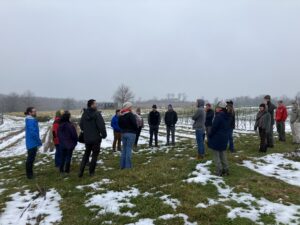
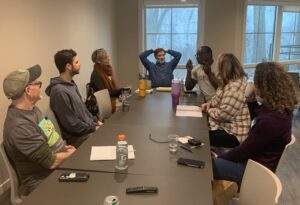
Milestone 3 -Engagement and Learning: Eighteen farmers host CFN team or mentor for onsite visit (6 site visits with 2 farmers at each farm equals total of 12 farmers, plus 6 beginning Farmers in mentorship program host visit for total of 18 farmers). Farmers learn from experienced farmer feedback and onsite assessment of farm operations (CFN team site visits: May 1- December 1, 2023; Mentor Site Visits: November 1, 2024 - October 30, 2025). Completed: November 1, 2025
Status: Complete (November 1, 2025)
Accomplishments: Red Wiggler and CFN staff visited 11 care farms (21 farmers) in MD, NY, NJ & MA, including Oxbow Farm (MD), EquiCenter (NY), Homesteads for Hope (NY), CapeAbilities Farm (MA), Prospect Meadow Farm at ServiceNet (MA), Cobblestone Farm (MA), A Meaningful Purpose at Reeds' Farm (NJ), OASIS TLC (NJ), Greens Do Good (NJ), Three Meadows Farm (NJ), and ELIJA Farm (NY). In addition, five experienced care farm mentors conducted on-site visits with five mentee farms through CFN’s Mentorship Program. Care Farmers shared successes and challenges and gained valuable peer connections. A noted highlight: A Red Wiggler farmer with intellectual and developmental disabilities participated in the overnight trip to visit care farms in Massachusetts, sharing about his role and job responsibilities at Red Wiggler.
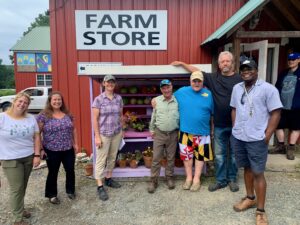
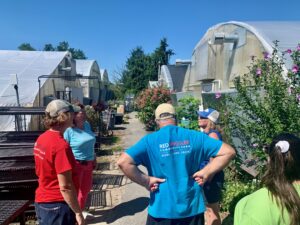
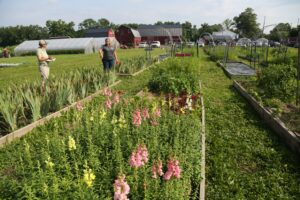
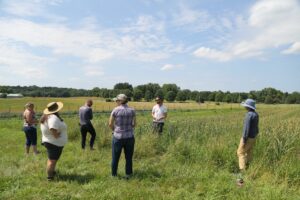
Milestone 4 -Learning: Six beginning farmers complete Mentorship program by applying for mini-grant. Project leaders match mentors and beginning farmers based on interests and location. Mentors (geographically spread across the Northeast) are compensated for up to three consultations including a site visit to the mentee farm. Mentees gain a valuable relationship with an experienced Care Farmer and practice knowledge gained by writing a grant for funding (November 1, 2024 - October 30, 2025). Completed: November 1, 2025
Status: Complete (December 1, 2025)
Accomplishments: Seven mentees (beginning care farmers) were matched with seven mentors (established care farmers) based on farm type, learning goals, and location. Over ten months, they visited each other’s farms and met for virtual consultations and check-ins. Mentees established valuable connections and opportunities to enhance their business and farming practices while increasing employment opportunities for individuals with intellectual and/or developmental disabilities (I/DD) on care farms. The mentee cohort met monthly to ask questions, share successes and challenges, and learn from one another’s experiences. CFN conducted a grant writing workshop for mentees, sharing best practices for creating a compelling and fundable grant proposal. Using an application created by CFN staff, mentees wrote a grant proposal, created a project budget and peer-reviewed one another’s grants. Through peer-learning and review, mentees learned how to write strong and compelling funding proposals.
Milestone 5 - Learning: Ten beginning Care Farmers participate in the annual series of four (1 hour) beginning Care Farm webinars (30 farmers total - across 3 years) and will learn specifics on how to start a Care Farm. Webinars will allow for discussion. Four weekly webinars will be repeated yearly in September (September 7, September 14, September 21, September 28 in 2023, 2024, 2025). Completed: October 30, 2025
Status: Complete (October 30, 2025)
Accomplishments: In September 2023, CFN hosted its first Beginning Care Farming Series virtually with 4 sessions:
- Want to Start a Care Farm: Where to Begin?
- Exploring Business Models: Nonprofit, For-Profit, or Partnership?
- Facility and Land Options: What’s Right for You?
- How Do I Fund A Care Farm?
Each session was recorded and can be viewed on the CFN website along with a resource page for each session. 29 unique participants attended and learned about specific topics that beginning care farmers must consider as they begin their journey.
In September 2024, CFN hosted its second Beginning Care Farming Series virtually with 3 sessions:
- Want to Start A Care Farm: Planning & Funding Your Care Farm
- Exploring Business Models and Facility & Land Options for Your Care Farm
- Care Farming Network’s Mentorship Program
Each session was recorded and can be viewed on the CFN website along with a resource page for each session. 13 unique participants attended and learned about specific topics that beginning care farmers must consider as they begin their journey.
In Fall 2025, CFN hosted its third Beginning Care Farming Series virtually with 3 sessions:
- Introduction to Care Farming: Foundations and Program Design
- From Idea to Action: Resources for Beginning Care Farmers
- Fundraising Strategies for Your Care Farm
Each session was recorded and can be viewed on the CFN website and YouTube channel along with a resource page for each session. 15 unique participants attended and learned about specific topics that beginning care farmers must consider as they begin their journey.
Milestone 6 -Learning: Twenty established or beginning farmers participate in each 1-hour learning webinar (100 individual farmers total - some farmers attend multiple workshops). Farmers will learn how to operate their Care Farm more effectively. Four webinars per year: (November 2023, December 2023, January 2024, March 2024, November 2024, December 2024, January 2025, March 2025, November 2025, December 2025, January 2026, March 2026). Completed: April 1, 2026
Status: In Progress
Accomplishments: In 2024, CFN planned & hosted 3 learning webinars, specifically for experienced and aspiring farmers working with the IDD population:
- Uncomfortable Confrontation: Simple De-escalating Tips That Work
- Building Healthy Relationships at Work
- Adaptive Farming Strategies
Each session was recorded and added to the CFN online resource library. 24 unique participants attended the 3 sessions including farmers with intellectual and developmental disabilities.
Milestone 7 -Engagement and Learning: Twenty farmers participated in each farm tour (for 75 individual farmers total - some farmers attend multiple farm tours). Farmers will learn in person how different Care Farms operate and establish connections with other farmers (2 tours/year: June 15, 2023; October 15, 2023; June 2024; Oct 2024; June 2025; October 2025). Completed: November 30, 2025
Status: Complete (November 30, 2025)
Accomplishments: In 2023, CFN hosted three farm tours at Red Wiggler Community Farm (MD), Madison Fields (MD), and OASIS TLC (NJ) with a total of 34 participants. In 2024, CFN hosted two farm tours at Homefields Care Farm (PA) and A Meaningful Purpose at Reeds Farms (NJ) with a total of 23 participants. In 2025, CFN hosted two farm tours at Homesteads for Hope (NY) and OASIS (PA) with a total of 20 participants. Each farm tour was led by both neurotypical and neurodivergent farmers and was neurodiversity-inclusive. Established farmers and beginning care farmers learned how each care farm operates and established connections with other farmers.
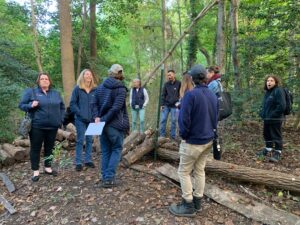
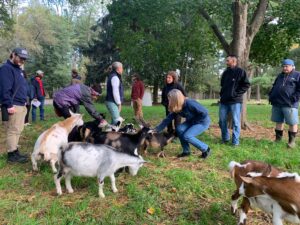
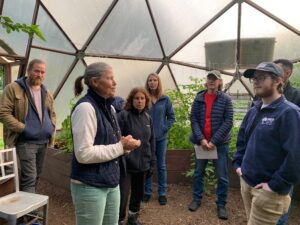
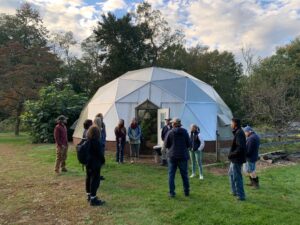
Milestone 8-Engagement and Learning: One hundred farmers engage with online educational resources highlighted in e-newsletters. These Care Farming resources will include best practices developed from the Winter Mentor retreat. Farmers will use these resources on their own farm to improve their Care Farming. The project team will track engagement through unique downloads online, views for videos and newsletter open rates (April 15, July 15, October 15, January 15, each year). Completed: February 1, 2026.
Status: In Progress
Accomplishments: CFN sent a monthly e-newsletter that highlighted Care Farms, events, and resources. 34 newsletters were sent from March 2023 - December 2025 with an average open rate of 53%. Since March 2023, the CFN email list has expanded from 257 to 1020 email subscribers.
Milestone 9: Engagement and Learning: Seventy-five established and beginning Care Farmers participate in person at each Annual Conference (estimating a total of 100 unique farmers, with some farmers participating twice). Farmers will establish important connections and learn valuable practices from their peers (February 2025, February 2026). Completed: March 1, 2026.
Status: In Progress
Accomplishments: CFN hosted its first Care Farming Network conference Jan 13-15, 2025 at the University of Massachusetts -Amherst with a farm tour at ServiceNet's Prospect Meadow Farm (MA) with 135 attendees from the Northeast region. 100 percent of attendee evaluations indicated they learned a new skill or gained knowledge that is applicable to their farm. Farmers built peer-connections, gained a renewed sense of community and excitement, gained confidence in their approaches and learned practical skills to take back to their farm. Plans are currently underway to host the second Care Farming Network conference February 9-11, 2026 in Gaithersburg, MD with a farm tour at Red Wiggler Care Farm (MD).
Milestone 10: Engagement and Learning: Thirty-six farmers consult with Red Wiggler or other Care Farm Mentors gaining specific knowledge on how to start a Care Farm or employ people with I/DD on their farm. Additionally, farmers will gain connections to an experienced mentor. Recurring: 1 consultation/month. Completed: April 1, 2026.
Status: In Progress
Accomplishments:Red Wiggler staff provided 46 consultations with beginning and established farmers, providing expert advice and guidance on how to start, build, and grow a care farm. Consultations included Zoom calls and visits to Red Wiggler Community Farm.
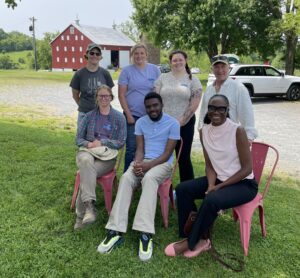
Milestone 11: Engagement and Learning: Seventy-five total farmers hear presentations from CFN team at major regional farming conferences. Presentations will be offered at conferences such as Future Harvest, Pasa and the Northeast Organic Farming Association (NOFA) conference. These conferences will serve as a recruitment opportunity into the CFN, as well as a chance to make important connections among Care Farmers in the Northeast (2 conferences per year: January and February, 2024, 2025, 2026). Completed: April 1, 2026.
Status: In Progress
Accomplishments: Red Wiggler and CFN presented at four national conferences and five regional conferences / networks including presenting at CFN Neurodiversity in the Workplace twice, Farmer Veteran Coalition (TX) and National Agriculture Marketing Summit (DC), exhibited and hosted a Care Farming panel at NOFA New Jersey (NJ), presented at Future Harvest (MD) and Montgomery County MD Eats (MD), and presented virtually to Farm to Institution New England and Penn State extension agents. Attendees learned about care farming, its therapeutic benefits, and how its neurodiversity-inclusive practices can be replicated.
Milestone 12: Evaluation: One hundred unique Farmers (over the course of all Network activities) complete surveys at each webinar, event, or consultation to establish baseline I/DD employment information, track knowledge/skill acquisition, and provide feedback. Surveys allow participants to convey what knowledge/skills they have gained, as well as topics they require additional assistance on. Recurring. Completed: April 1, 2026.
Status: In Progress
Accomplishments: CFN staff developed a post-event evaluation survey. Over 100 evaluations have been completed for these CFN activities: Virtual Beginning Care Farming Series, Virtual Webinars, Mentorship Retreat, Care Farm Tours and Meetups, and Care Farm Visits. CFN staff used these evaluations to inform future programming topics and to understand the knowledge and skills learned.
Milestone activities and participation summary
Educational activities:
Participation summary:
Learning Outcomes
Performance Target Outcomes
Target #1
90
Farmers will feel an increased sense of connection or will increase their farm effectiveness
15 additional people with intellectual or developmental differences will be hired and 25 Care Farms will join the Care Farming Network.
41
Farmers feel an increased sense of connection or have increased their farm effectiveness.
2023 & 2024 & 2025 Update:
Attendees completed a post-evaluation survey after these CFN Activities: Virtual Beginning Care Farming Series, Care Farm Tours and Meetups, Webinars, and Care Farm Visits. Evaluations asked a series of questions: "Do you feel more connected to other Care Farmers after this event or visit? <yes/no> and "Will this new skill/knowledge/resource improve your effectiveness?" <yes/no>.
Additional Project Outcomes
2023 & 2024 & 2025 Update:
CFN introduced people to the concept of care farming and its therapeutic benefits, including hiring people with I/DD in these media outlets:
- NPR Here and Now: "New network aims to expand emotional support care farms in the U.S."
- Fox5 DC: "Testing out Claire's green thumb at Red Wiggler Farm"
- WJLA7: "'Treated as equals': Md. farm employing people with disabilities hopes to inspire change"
- Izzak Walton League Outdoor America: "Fertile Ground for Inclusivity: Differently Abled Adults Discover Farming"
- Ambrook Research, "Cultivating More Than Crops"
- Reimagination Cafe, “Cultivating Change: The Transformative Power of Care Farming Podcast”
- Offrange, “A Different Kind of Farm”
- Daily Hampshire Gazette, “Planting the ‘care farm’ seed: ServiceNet touts its therapeutic farm in Hatfield a model for first-ever conference at UMass”
- New England Public Media, “Growing CARE”
- WWLP TV, “National Care Farming Conference at UMass Amherst”
- Substack, Eliza Factor’s Lonely Worm Farm, “Care Farming & Kizmet”
- Delaware Today, “Care Farms Cultivate Healing Across Delaware”
- The Packer, “Ag Apprentice Program Helps Disabled Adults Grow”
- Raising Kellan Podcast, “Introducing Care Farming Network”
- Hamilton Spectator, “While touring a therapy farm, I got a call that left me reeling”
“This network is such a gift! Just knowing there are other like-minded folks out there just trying to make a difference and use their land for good has been so inspiring.” -apple farmer in eastern PA whose farm produces gourmet small batch apple cider and apple butter "planned, produced, packaged, and promoted with talented help of people with disabilities.
“I'm really grateful for these sessions. Everyone who spoke was knowledgeable and inspirational, and I'm very glad I attended. Thank you so much for all your time, dedication, hard work and kindness!” - Beginning farmer and aspiring Care Farmer in PA
“Thank you so much for meeting with me yesterday! I truly felt your deep support and caring, and I am grateful. It is relieving to share with folks who understand the intricacies of a care farm on so many levels. Our conversation sparked many thoughts that I will be marinating!” - vegetable market farmer in Long Island, NY who hosts on-farm neurodiversity-inclusive organic growers courses.